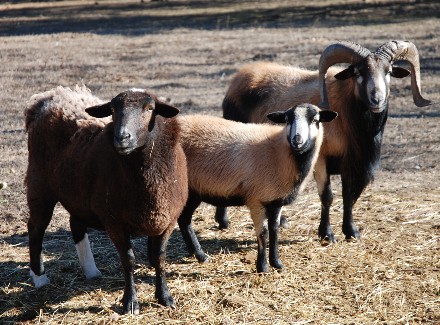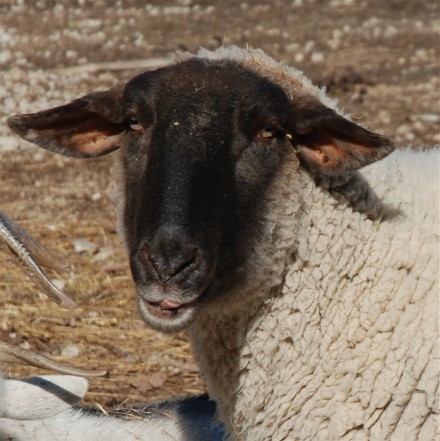|
Sheep - American Black Bellied and Suffolk


American Blackbellied Sheep
Suffolk sheep
The American Blackbelly sheep is a hair sheep,
originally developed by crossbreeding programs involving
primarily Mouflon and Barbados Blackbelly. Resulting
hybrids produced poor horn growth that interfered with
the animals' faces. Repeated back crossing on the
Mouflon improved horn growth to the extent that the
hybrid attracted the attention of trophy hunters.
Eventually, a strain of exotic looking animals with
massive horns evolved and came to be referred to as
"Corsican" in reference to the origin of the Mouflon
ancestors. The original cross has subsequently been
developed into several distinctive breeds of hair sheep.
The American Blackbelly is a breed of Corsican descent
that is readily identifiable by a very well-defined coat
pattern and is registered by the Barbados Blackbelly
Sheep Association International. Rams generally display
spectacular horns, while ewes generally are polled
(hornless.) The sheep sport a distinctive hair coat in a
range of tan to brown to red, with dramatic black
markings.
The American Blackbelly is a thrifty, energetic,
small- to medium-sized sheep with a strong flocking
instinct. It is well adapted to a broad range of
environments, breeding goals, and management styles. On
the farm, it is desired for its productivity and
thriftiness, great prolificacy, and fairly low
maintenance. Mature ewes generally have two to three or
more lambs in any season, and depending on management,
are capable of three litters every year and a half or
so. They are very good mothers. Because of their
fecundity and out-of-season breeding, ewes are suited to
an accelerated lambing program.
We have a small herd of sheep of both Suffolk wool
sheep and Black-bellied hair sheep. We shear
our wool sheep every Spring but not the haired sheep.
There is not anything much cuter than a baby sheep or
goat. We usually have bottle babies during summer
Science Camp for camper to hold and feed.
More information on wool Sheep
Information on Barbados sheep
|